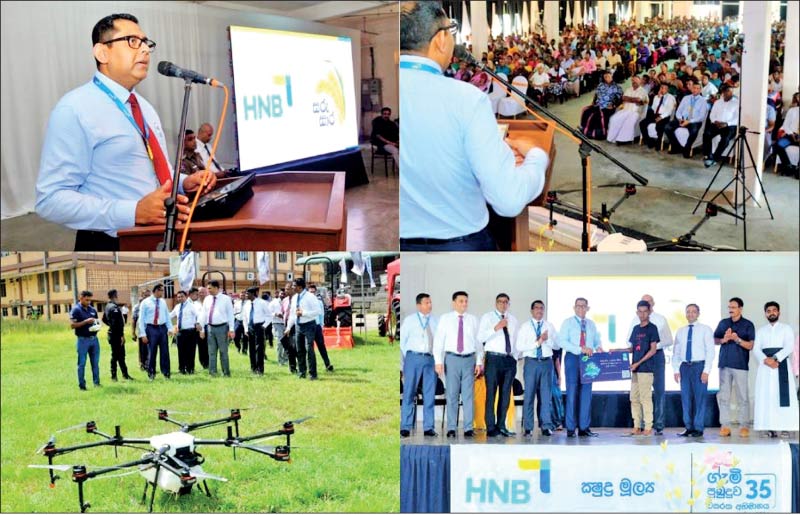Saturday Feb 21, 2026
Saturday Feb 21, 2026
Friday, 5 July 2024 02:36 - - {{hitsCtrl.values.hits}}

HNB Acting CEO Damith Pallewatte (top left) discussing the potential of agri-modernisation with attendees at HNB Sarusara launch event in Nochchiyagama
Driving forward its mission to support and modernise the nation’s agriculture sector, HNB PLC, celebrated a step forward in the nation’s agricultural development with the launch of the ‘HNB Sarusara’ program in Nochchiyagama, Anuradhapura.
Attended by over 700 agripreneurs, the pioneering event established a platform for demonstrating smart and precise agricultural techniques and solutions capable of enhancing farming practices, increasing productivity, and improving livelihoods leveraging modern technology.
The event also featured a mini agriculture exhibition with over 20 leading agribusiness solution providers from across the country, offering comprehensive seed-to-shelf solutions that greatly benefitted the participants. This initiative is the first of several planned interactions with the 16,000-strong farming community in Nochchiyagama, aiming to provide agripreneurship solutions through HNB’s innovative agribusiness drive.
The event was attended by HNB Acting CEO Damith Pallewatte, Microfinance Head Mahinda Senevirathne, SME Products and Partnerships Head N. Kethiswaran, Regional Business Head – North-Central Region Nirosh Edirisinghe, and Regional Microfinance Manager – North-Central Region Hiran Karunarathne, accompanied by the team at Nochchiyagama led by Manager Nuwan Chandrasekara. Several other branch teams and leadership from across the HNB’s NCR customer centres were also in attendance for the landmark event.
Speaking at the event Pallewatte said: “HNB was one of the first banks to establish a presence in Nochchiyagama, so we have a special connection with this community. For the last 45 years, we have sought to support them and their agripreneurs to build thriving, sustainable businesses by raising awareness and building capacity for agri-modernisation and supporting the adoption of fuse technologies at the grassroots through such events.”
“In this manner, we hope to drive a powerful revitalisation of the entire national agricultural sector and the broader economy. We express our sincere gratitude to our HNB agripreneurs for engaging in this vital effort, and to our teams on the ground who continue to show outstanding dedication to our continuing efforts to act as a partner in progress to all Sri Lankans.”
The event marked a historic day for HNB’s Microfinance Department, and was well received by the participants and the community at large, many of whom showed great enthusiasm and pride in participating, sharing their own inspiring stories, achievements, and experiences directly with Pallewatte and his team.
“We are completely committed to providing the financial support and innovative tools, training, and exposure needed for these communities to thrive in this dynamic agricultural landscape. From precision agriculture and IoT integration to automated machinery and renewable energy solutions, we are dedicated to empowering you with technology that drives efficiency, productivity, and sustainability,” said Pallewatte.
“Furthermore, our ‘HNB Sarusara’ program aims to transform the agricultural sector by integrating cutting-edge practices, advanced financing solutions, and state-of-the-art technology. Our mission is to equip agripreneurs with the knowledge and resources for smart agriculture, boosting both productivity and sustainability,” he added.
Through the ‘HNB Sarusara’ program, the bank aims to support 30,000 agripreneurs nationwide to modernise their businesses, and improve their productivity over the coming year. Together with its flagship ‘HNB Gami Pubuduwa’ initiative – which provides a platform for agripreneurs to gain access to local and global markets – the bank is set to cultivate a new wave of entrepreneurship, fostering growth, development, and a more prosperous future for Sri Lanka’s rural and agrarian communities.